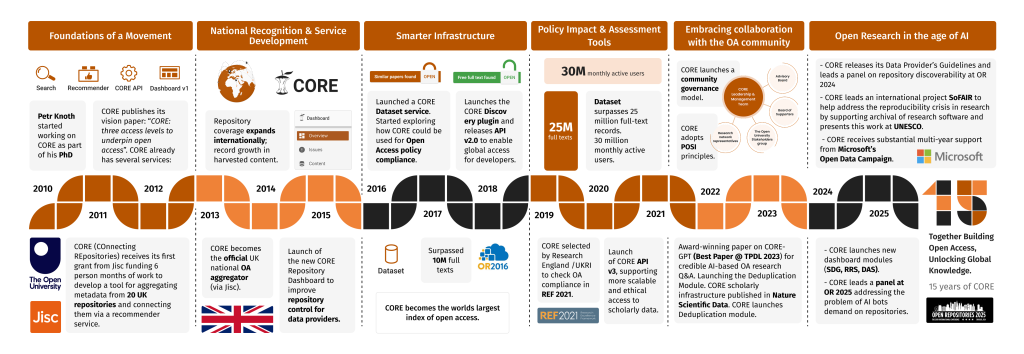Fifteen years ago, CORE (COnnecting REpositories) began as a PhD project with a simple but ambitious idea: to make open research more accessible, not just for humans, but for machines too. At a time when few could imagine tools like ChatGPT answering questions based on vast collections of scientific literature, it was already clear that the future of knowledge would depend on infrastructure capable of delivering information in ways both people and machines could understand. What followed was a decade and a half of learning, building, listening and working with the global research community to shape a more open, intelligent, and discoverable world of knowledge.
From its first Jisc grant in 2011, supporting a prototype that initially linked just 20 repositories, to today’s global infrastructure indexing millions of research outputs, the story of CORE has always been one of scale through collaboration. And of impact born from a shared commitment to openness.
In 2013,after winning a Jisc commissioned tender, CORE became the official UK national open access indexing service. Within a year, its reach expanded well beyond the UK, helping international repositories share content and grow their visibility. It was during these formative years that some of the tools we now take for granted, like the CORE Repository Dashboard and Recommender system, first came to life.
The platform matured quickly. By 2017, CORE had indexed over 10 million full-texts and began contributing directly to policy compliance, supporting REF2021 through partnerships with Research England, UKRI. These milestones weren’t just technical they were signals of trust in CORE’s data quality and stewardship and its value to the Open Research community.
CORE’s own research, such as the development of CORE-GPT, illustrates how essential its data has become in an era where AI is reshaping knowledge discovery. As machine learning tools increasingly depend on open, structured, and scalable datasets,CORE’s index of over 25 million full texts provides a critical foundation for experimentation, transparency, and reproducibility in scholarly technology. This highlights CORE’s evolving role as both a service and a research enabler that supports the development of thoughtful, responsible tools for the scholarly community.
Our recent initiatives reflect where we’re heading next. We’ve participated and contributed to global discussions on scholarly content such as on repository discoverability and next generation repositories, led initiatives to facilitate research reproducibility through archival of research software (SoFAIR project), and have always been on the forefront of supporting repositories, such as by being a leading voice on issues surrounding AI bots and repositories. We have also deepened our community model to ensure those who use CORE have a voice in how it evolves.
Looking at 2025, CORE isn’t just marking a milestone, it’s stepping into a new chapter with the same curiosity and care that defined its origins. This year, we’ve launched a dedicated Rights Retentions Statements (RRS), Data Availability Statements and SDG modules, hosted panels addressing the pressure of AI bot traffic on repositories, and received multi-year support from Microsoft’s Open Data Campaign to continue strengthening global open infrastructure and conduct research into the monitoring of open access content worldwide.
But anniversaries are about more than achievements. They’re moments to pause, to thank our community, and to set our sights on what comes next.
In the years ahead, CORE will continue investing in ethical and responsible AI, supporting reproducibility in science, and working hand-in-hand with repositories and researchers to co-create solutions. Our commitment to indexing, transparency, and global collaboration remains unchanged.
This milestone is a collective one. It belongs to everyone who believed in CORE’s mission, shared data, shaped policy, and pushed us to do better.
Thank you for walking this journey with us.
This article is a follow-up to: CORE at 15: Together Building Open Access, Unlocking Global Knowledge

